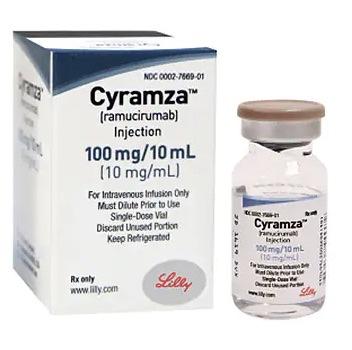Cyramza
Generic name: ramucirumab [ RA-mue-SIR-ue-mab ]
Drug class: VEGF/VEGFR inhibitors
What is Cyramza?
Cyramza is a cancer medicine that interferes with the growth and spread of cancer cells in the body.
Cyramza is used to treat stomach cancer, colorectal cancer, or non-small cell lung cancer that has spread to other parts of the body, and hepatocellular carcinoma. Ramucirumab may be given alone or in combination with other cancer medicines.
Cyramza is usually given after other cancer medicines have been tried without success.
Warnings
Cyramza can increase your risk of serious bleeding. Stop using this medicine and call your doctor at once if you have severe stomach pain, bloody or tarry stools, coughing up blood, or any heavy or unusual bleeding.
Before taking this medicine
You should not use Cyramza if you are allergic to ramucirumab, or if you have ever had:
-
uncontrolled high blood pressure.
To make sure Cyramza is safe for you, tell your doctor if you have:
-
high blood pressure;
-
a thyroid disorder; or
-
an unhealed incision from recent surgery.
This medicine can harm an unborn baby. Tell your doctor if you are pregnant or plan to become pregnant while using this medicine. Ramucirumab may affect fertility (your ability to have children).
Use birth control to prevent pregnancy while you are receiving Cyramza, and for at least 3 months after your treatment ends.
You should not breastfeed while using ramucirumab.
How is Cyramza given?
Cyramza is given as an infusion into a vein through an IV. A healthcare provider will give you this infusion.
You may be given medication to prevent certain side effects while you are receiving this medicine.
Cyramza is sometimes given once every 2 weeks. It may also be given in a 21-day treatment cycle and you may only need to use the medicine during the first day of each cycle. Follow your doctor's dosing instructions very carefully.
While using Cyramza, you may need frequent blood or urine tests. Your blood pressure will need to be checked often.
If you need surgery, tell the surgeon ahead of time that you are using Cyramza. You may need to stop using the medicine for a short time.
What happens if I miss a dose?
Call your doctor for instructions if you miss an appointment for your Cyramza injection.
What happens if I overdose?
Since this medicine is given by a healthcare professional in a medical setting, an overdose is unlikely to occur.
What should I avoid while receiving Cyramza?
Follow your doctor's instructions about any restrictions on food, beverages, or activity.
Cyramza side effects
Get emergency medical help if you have signs of an allergic reaction to Cyramza: hives; difficult breathing; swelling of your face, lips, tongue, or throat.
Some side effects may occur during the injection. Tell your caregiver right away if you feel light-headed, chilled, sweaty, or have chest pain, chest tightness, back pain, trouble breathing, or numbness and tingling.
Cyramza can increase your risk of serious bleeding.
Call your doctor at once if you have:
-
signs of stomach bleeding - severe stomach pain, bloody or tarry stools, coughing up blood or vomit that looks like coffee grounds;
-
any wound that will not heal;
-
headache, confusion, change in mental status, vision loss, seizure (convulsions);
-
severe or ongoing nausea, vomiting, or diarrhea;
-
rapid weight gain, especially in your face and midsection;
-
low white blood cell counts - fever, mouth sores, skin sores, sore throat, cough, trouble breathing;
-
kidney problems - puffy eyes, swelling in your ankles or feet, weight gain, urine that looks foamy;
-
symptoms of a blood clot - sudden numbness or weakness (especially on one side of the body), sudden severe headache, slurred speech, problems with vision or balance; or
-
heart attack symptoms - chest pain or pressure, pain spreading to your jaw or shoulder, nausea, sweating.
Common Cyramza side effects may include:
-
sores or white patches in or around your mouth, red or swollen gums, trouble swallowing or talking, dry mouth, bad breath, altered sense of taste;
-
feeling weak or tired;
-
diarrhea, loss of appetite;
-
nosebleed;
-
low white blood cell counts; or
-
high blood pressure.
This is not a complete list of side effects and others may occur. Call your doctor for medical advice about side effects. You may report side effects to FDA at 1-800-FDA-1088.
What other drugs will affect Cyramza?
Other drugs may interact with ramucirumab, including prescription and over-the-counter medicines, vitamins, and herbal products. Tell each of your health care providers about all medicines you use now and any medicine you start or stop using.
More about Cyramza (ramucirumab)
- Check interactions
- Compare alternatives
- Pricing & coupons
- Drug images
- Side effects
- Dosage information
- During pregnancy
- FDA approval history
- Drug class: VEGF/VEGFR inhibitors
- Breastfeeding
- En español
Professional resources
Related treatment guides
Further information
Remember, keep this and all other medicines out of the reach of children, never share your medicines with others, and use Cyramza only for the indication prescribed.
Always consult your healthcare provider to ensure the information displayed on this page applies to your personal circumstances.
Copyright 1996-2024 Cerner Multum, Inc. Version: 3.01.

